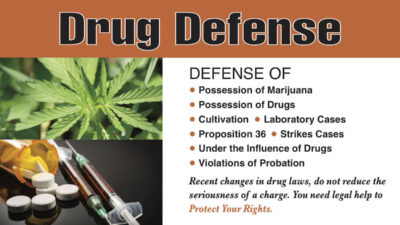Often this office files motions to suppress evidence alleging that the officers illegally detained or illegally arrested or illegally searched a person, an automobile, the containers of the automobile, certain portions of the automobile or certain portions of the person to wit blood, breath or urine tests.
These motions are required to be in writing. The DA will usually subpoena one or more police officers, toxicologists or other expert witnesses to testify at the hearing to justify the arrest, the search, the seizure or the lack of giving of certain evidence that we’ve requested.
Sometimes these matters result in testimonial evidence where a police officer testifies and is cross-examined by your attorney and sometimes the matters are submitted on written police reports or upon a stipulated or agreed upon set of facts that mayor may not be exactly similar to the set of facts in your case.
Whether or not there will be actual testimony or whether or not to produce defense attorney defense testimony is an issue best left to your lawyer.
Ordinarily in 99.99% of the cases the defense lawyers do not present evidence but rely on the DA to present evidence or written reports or what we call points and authorities or law in opposition to our motions.
If this attorney thinks it is necessary for you to be at such a motion you will be notified in advance and should come into this office to see us prior to the hearing whether it’s for you to just be there to hear the officers testify or whether it’s for you to testify yourself or have friends or witnesses testify.
Unless you are specifically notified otherwise, it is not necessary for you to appear in court.
Further, most hearing dates for the presentation of testimony are continued one or more times because of unavailability of witnesses, the inability of the DA to proceed, or to find a judge or have time to hear the various cases. So before you waste your time coming to court you should wait for notification from this office or contact this office to see if your presence is necessary.
Whether a motion to suppress or other motion is granted or denied may not be determinative of the ultimate outcome in your case. In many cases it’s done routinely and in many cases it is the crux or important point in the case and can only be determined by your lawyer telling you in advance. But if you are not asked to come to court, more likely than not, the issue is one of routine application and not totally determinative of your case. It’s often a way to find out about the facts, the evidence, and the cop before trial.






